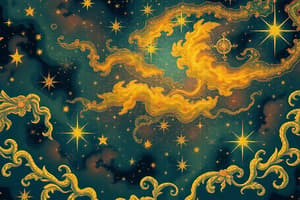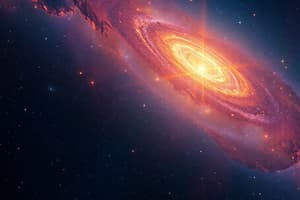Podcast
Questions and Answers
What is the initial stage of a star's life cycle?
What is the initial stage of a star's life cycle?
- Protostar
- T-Tauri Phase
- Giant Gas Cloud (correct)
- Main Sequence
What occurs when gas particles collide within the molecular cloud during star formation?
What occurs when gas particles collide within the molecular cloud during star formation?
- Core contraction due to gravity
- Energy release resulting in protostar formation (correct)
- Nuclear fusion begins
- Formation of helium molecules
Why does a protostar release tremendous amounts of energy during the T-Tauri Phase?
Why does a protostar release tremendous amounts of energy during the T-Tauri Phase?
- Exhaustion of hydrogen fuel in the core (correct)
- Materials falling into the protostar
- High core temperature supporting nuclear fusion
- Low temperature preventing molecule formation
When does a star enter the Main Sequence phase of its life cycle?
When does a star enter the Main Sequence phase of its life cycle?
What happens when the hydrogen fuel in a star's core runs out?
What happens when the hydrogen fuel in a star's core runs out?
Which process prevents the core collapse in a star during its life cycle?
Which process prevents the core collapse in a star during its life cycle?
What is the result of the fusion of helium molecules in a star's core?
What is the result of the fusion of helium molecules in a star's core?
What determines a star's lifespan and destiny according to the text?
What determines a star's lifespan and destiny according to the text?
What makes gas particles collide within a molecular cloud, leading to the formation of a protostar?
What makes gas particles collide within a molecular cloud, leading to the formation of a protostar?
What happens when a star's core temperature rises sufficiently during its Main Sequence phase?
What happens when a star's core temperature rises sufficiently during its Main Sequence phase?
Study Notes
The Life Cycle of Stars: Formation
Stars are born and grow from colossal clouds of gas and dust, called nebulae. As gravity pulls matter together, these nebulae eventually form dense clumps, which are the beginnings of stars. A star's mass determines its lifespan and destiny.
Giant Gas Cloud
An enormous cloud of hydrogen and helium gas, with a temperature low enough to allow molecule formation, is the initial stage of a star's life cycle.
Protostar
As gas particles collide within the molecular cloud, heat energy is produced. This results in the formation of a warm clump of molecules, known as a protostar.
T-Tauri Phase
Materials cease falling into the protostar, and the star releases tremendous amounts of energy. At this stage, the core temperature is not high enough to support nuclear fusion.
Main Sequence
The star's core temperature rises to the point that nuclear fusion of hydrogen atoms into helium begins. This exothermic process releases more heat than it consumes, making the core replete with energy.
Red Giant
When the hydrogen fuel in the core runs out, the core contracts under gravity, and the star expands. As it expands, the star becomes cooler, appearing red.
The Fusion of Heavier Elements
Helium molecules fuse in the star's core, releasing energy and preventing core collapse. The fusion process continues, producing heavier elements like carbon, iron, and beyond.
Supernovae and Planetary Nebulae
When the star's core runs out of fuel, the star can explode in a supernova, creating a neutron star or black hole if the remnant is less than or more than three times the mass of our Sun, respectively. Lighter stars end their lives as white dwarfs, surrounded by a planetary nebula.
The life cycle of stars is a complex process, from their birth in nebulae to the dispersal of elements they create. Understanding the life cycle of stars helps us see how the universe evolves and the role stars play in shaping our world.
Studying That Suits You
Use AI to generate personalized quizzes and flashcards to suit your learning preferences.
Description
Test your knowledge on the formation stages of stars, from giant gas clouds to the fusion of heavier elements. Learn about protostars, the main sequence, red giants, and supernovae in this quiz.




